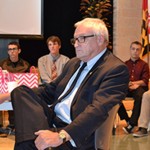
NEWARK – Area students tackled some of the key environmental issues facing the world today during a debate at Worcester Technical High School.
The debate, moderated by Sen. Jim Mathias and Worcester County Board of Education member Bill Gordy, gave the students the chance to share their opinions on everything from fracking to wind farms.
“I have such great respect for you,” Mathias said. “You all are our future.”
The event, organized by pre-engineering teacher Valerie Zienty, started with a discussion of wind farms and how much of an aesthetic affect they could have in an area known for tourism.
Student Samantha Ewancio praised the benefits of wind mills.
“I think they’re a great way to make clean energy,” she said.
Evan Haas said he thought energy was more important than aesthetics.
“Sustainable energy is one of the most important problems we face as a nation,” he said. “The search for renewable clean energy is something we should focus on. Wind farms are a solution to that problem.”
Mathias told the teenagers he’d struggled to make a decision on offshore wind energy because of his concern on the effect it could have on Ocean City.
“It wasn’t an easy one for me,” he said, adding that he eventually voted to support offshore wind in Maryland.
Mathias also asked for the students’ thoughts on solar energy and how they’d prioritize the need for energy — and thus land for solar arrays — with the need for land for agriculture. Students were in agreement that solar panels could be installed throughout the world where buildings already existed so that land for agriculture could be maintained. Owen Dennis pointed out that the stadium where the Philadelphia Eagles played had solar panels on it. He said farming wasn’t feasible in cities and places where development already existed, so solar projects should be directed there.
“We can’t farm there if there are buildings,” he said. “We should use that space.”
When audience members were invited to share their thoughts, Christopher Gooding said he thought the main issue with solar energy — as well as with wind energy — was the fact that existing infrastructure wasn’t made to handle it.
Student Logan Romberger replied that he thought there would be time for new infrastructure to be developed.
“This is helped by the fact that switching (to solar and/or wind power) is going to be a gradual process,” he said.
On the controversial issue of fracking, students expressed mixed views. While some said it could benefit developing countries, others said it was dangerous and was not a long-term solution, as it produced natural gas.
“It’s going to run out,” said student Evan Vincent. “We’re going to have to stop. We might as well start planning around it now.”
Following Monday’s debate, a handful of students, selected for their skill in expressing their opinions, will have the opportunity to visit various sites in Annapolis and attend a senate session before having lunch with Mathias.

